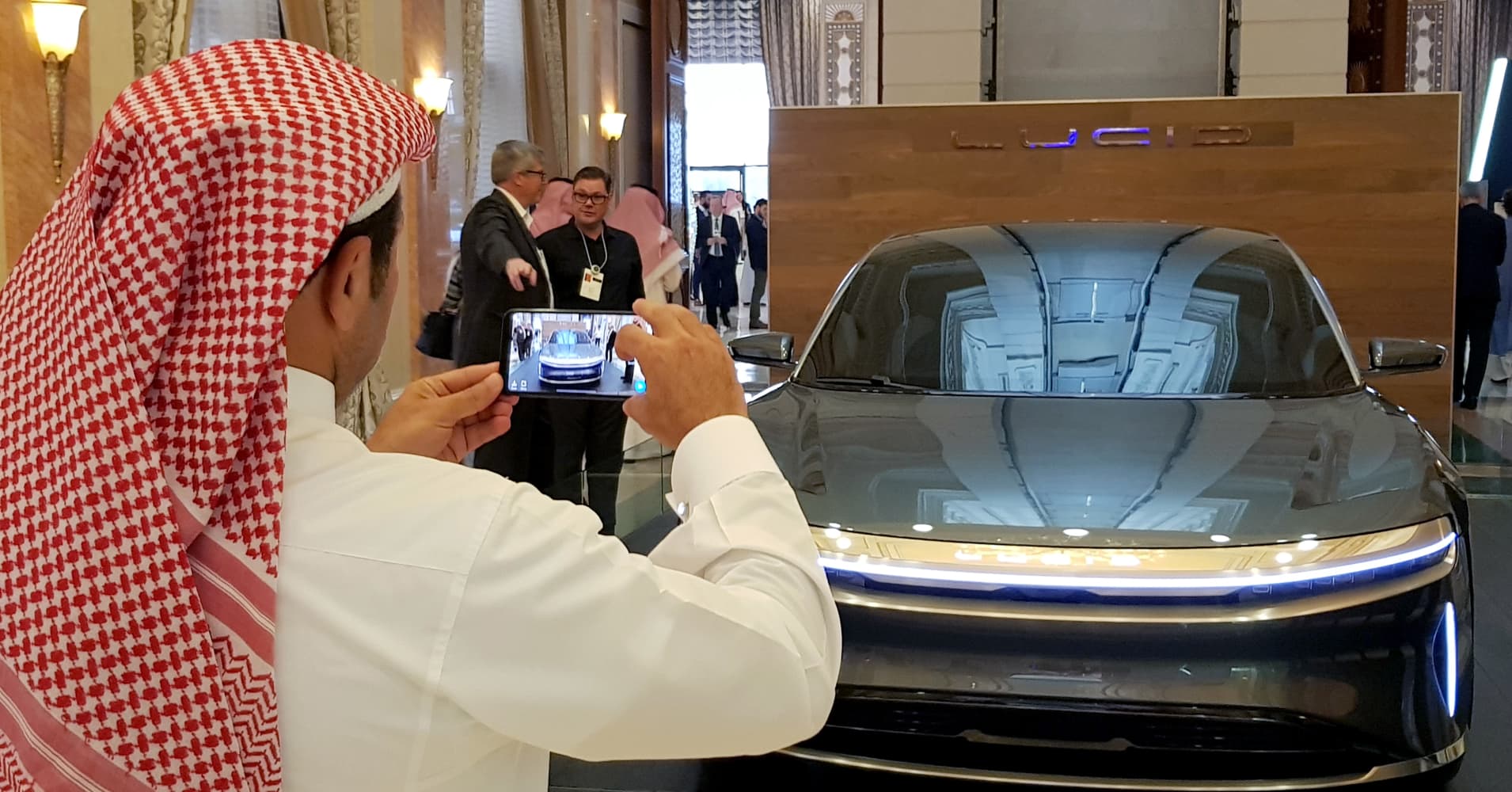- EVs made up only 1% of total vehicle sales in the kingdom in 2024, as reported by PwC.
- Saudi Arabia is establishing its own electric vehicle manufacturing sector and holds a controlling share in California-based EV company Lucid Motors.
- The introduction of Tesla in Saudi Arabia occurs as the automaker experiences declining sales due to criticism surrounding CEO Elon Musk’s contentious involvement with the Trump administration.
Tesla, Inc.
is making its debut sales in Saudi Arabia, the oil-rich nation where extensive deserts stretch across vast distances filled with fuel-thirsty SUVs—and finding charging stations can be nearly impossible for hundreds of miles.
The U.S. electric car manufacturer anticipates that their achievements in nearby nations such as the United Arab Emirates, along with a modest yet expanding base of EV purchasers in the area, indicate promising future demand.
The scheduling is significant – Tesla plans to host its unveiling ceremony in Riyadh on April 10, followed by the opening of temporary retail locations in Riyadh, Jeddah, and Dammam on April 11. This timeline precedes an eagerly awaited trip by U.S. President Donald Trump to Saudi Arabia, the United Arab Emirates, and Qatar, which is scheduled for April but hasn’t been formally announced yet.
It also comes as the carmaker faces
plummeting sales
, particularly in Europe, amid backlash against Tesla founder and CEO Elon Musk’s controversial role in the Trump administration.
Discover our worldwide top-selling range and enter a realm fueled by solar power, supported by battery technology, and propelled by electric cars,” the announcement on Tesla’s website stated. “Embrace the future of self-driving with Cybertruck, and encounter Optimus, our human-like robot, as we present what lies ahead in artificial intelligence and robotics.
Even though Saudi Arabia is known for its abundance of oil riches, electric vehicles (EVs) are not unfamiliar territory there. The country’s sovereign wealth fund, called the Public Investment Fund, has shown interest in this area.
majority stakeholder in U.S.-based luxury EV company Lucid Motors
Since 2019, in 2023, Lucid launched its initial automobile production plant in Saudi Arabia.

The kingdom is also establishing its own Saudi-produced electric vehicle brand called Ceer Motors via a partnership between the Public Investment Fund (PIF) and the Taiwanese company Foxconn. Ceer aims to launch in various Middle Eastern markets starting in 2025.
The push into the EV manufacturing space is part of Vision 2030, Saudi Arabia’s sweeping campaign to diversify its economy away from oil reliance.
The kingdom likely sees Tesla’s entrance into the market as furthering its stated goal of transitioning 30% of all cars in the capital Riyadh to electric by 2030, as part of a broader strategy to halve the city’s emissions.
Chinese competition
The Chinese electric vehicle manufacturer BYD is also already operating in the Saudi market, which means Tesla confronts competition not only from BYD but also from Lucid Motors in a relatively nascent space where EVs made up just a portion of total sales.
just 1% of all car sales
in the kingdom in 2024, according to a report from consulting firm PwC.
“Tesla may not lead the market here as they have done elsewhere. They were typically among the first in many regions—however, this isn’t the case in Saudi Arabia anymore,” said Tatiana Hristova, who directs CEE and MEA vehicle sales forecasting at S&P Global Mobility, during an interview with ecosundiaries.com’s Access Middle East on Wednesday.
“BYD cars have established themselves in the marketplace, though they aren’t alone among electric vehicles out there… starting off won’t be easy,” she stated. According to S&P forecasts, between 10,000 to 15,000 Tesla units are expected to sell in the nation over the initial two years following the company’s launch in Saudi Arabia, which includes sales for this year as well.
“Following that, it will undoubtedly encounter intense competition from local manufacturers as well as Chinese vehicles,” Hristova noted.
The expansion into Saudi Arabia also suggests a recovery of the
previously fraught relationship between Musk and the kingdom
, which led to Tesla expanding into nearly every Gulf country except for the Saudi kingdom until now.
According to PwC Middle East consumer survey data from last year, “more than 40% of consumers in KSA are considering purchasing an EV in the next three years.”
In the kingdom, charging stations are scarce, yet their recently established Electric Vehicle Infrastructure Company aims to construct 5,000 rapid chargers nationwide by 2030, according to the report.
Hristova highlighted an “accumulated group of customers in the kingdom who have been waiting for Tesla,” which she sees as another encouraging indicator for the company’s local launch.
“She stated that we anticipate strong interest in Tesla cars over the next few years. She also mentioned her belief that ‘unavailability increases desirability’.”